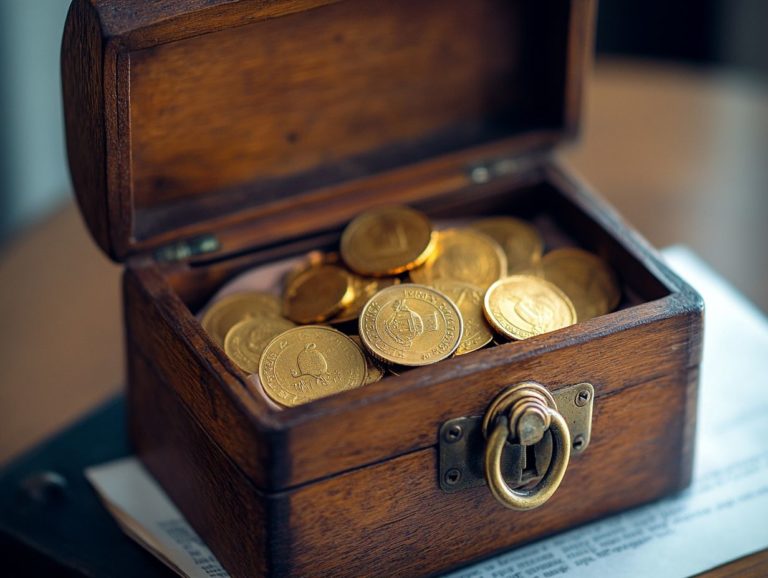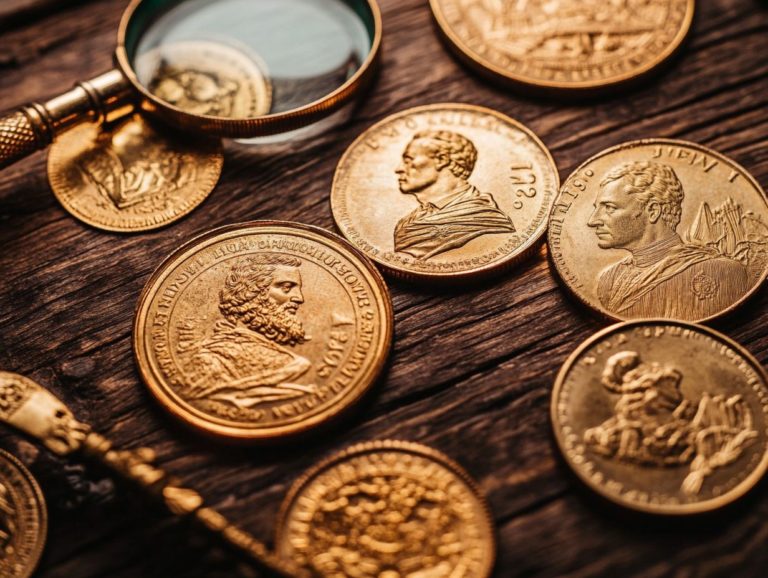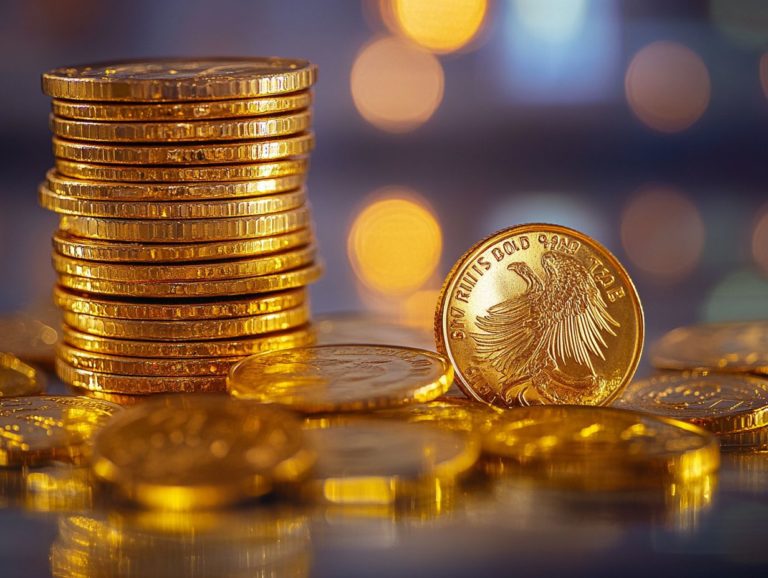The Importance of Gold in Crisis Situations
Gold has long been regarded as a bastion of stability during turbulent times. Its historical significance still profoundly influences its value today.
In an age characterized by economic uncertainty and geopolitical tensions, grasping gold’s role as a crisis resource becomes essential. This exploration delves into why gold is a dependable hedge against inflation and a universally accepted medium of exchange.
You’ll find insights on a variety of investment options and practical tips for utilizing gold as a currency in emergencies. Immerse yourself in this journey to uncover how gold can serve as your ally in the face of adversity.
Contents
- Key Takeaways:
- Why Gold is Your Best Friend in a Crisis
- Why Gold is Valuable in Crisis Situations
- How to Invest in Gold for Crisis Preparedness
- Using Gold as a Currency in Emergency Situations
- Frequently Asked Questions
- What is the significance of gold in crisis situations?
- Why is gold considered a safe-haven asset?
- How does gold hold its value during crisis situations?
- In what ways can gold be used in crisis situations?
- How has the importance of gold in crisis situations been demonstrated in history?
- What role does gold play in the global economy during crisis situations?
Key Takeaways:
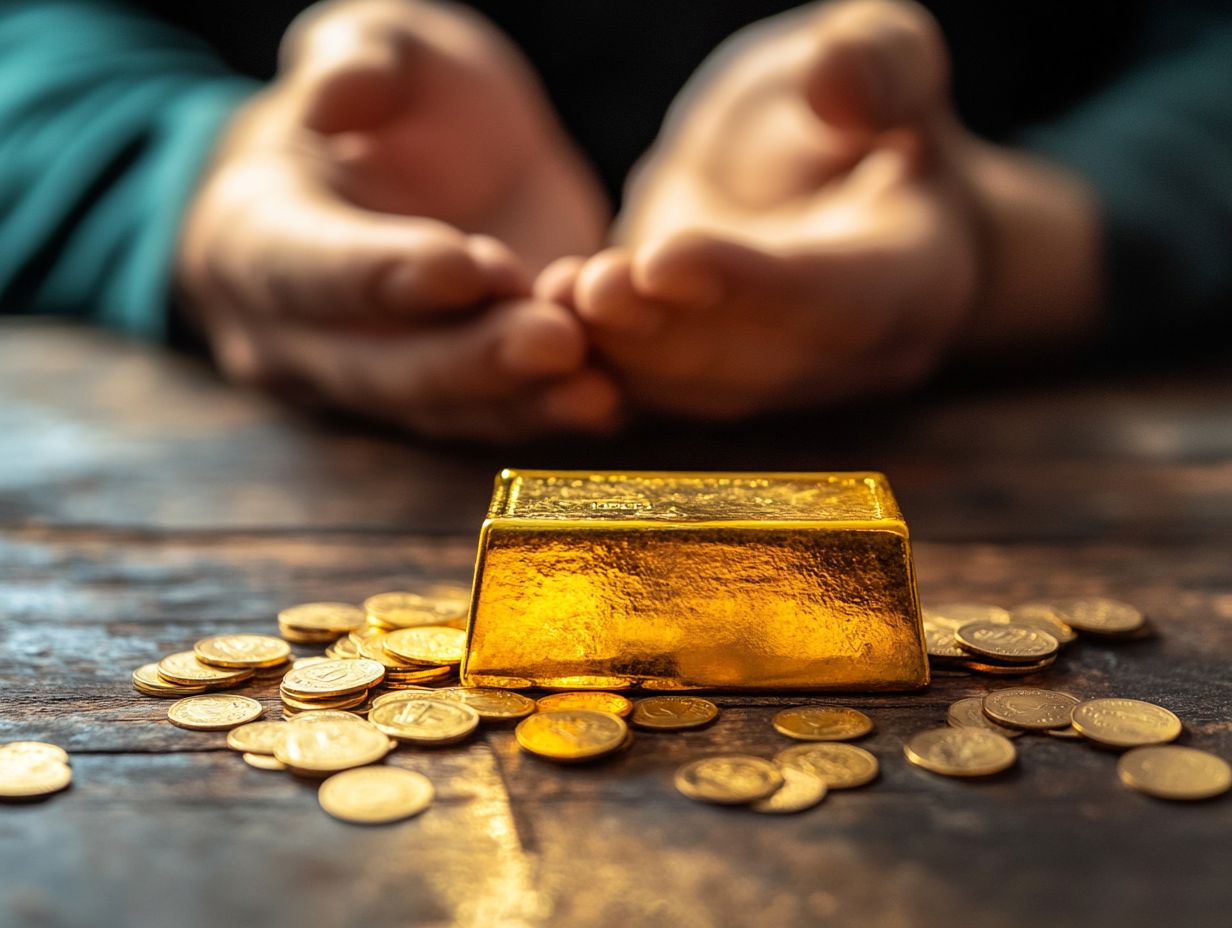
- Recognize gold’s long history as a valuable resource in times of crisis due to its stability and global acceptance.
- Understand how gold acts as a hedge against inflation and a reliable store of value, making it a crucial asset to have in your portfolio.
- Explore various forms of investing in gold, such as physical gold, gold ETFs, or gold mining stocks, which provide flexibility for crisis preparedness.
Why Gold is Your Best Friend in a Crisis
Gold has long stood as a vital resource in times of financial turmoil, acting as a steadfast store of value amid economic uncertainty. It offers a reliable asset that can protect your wealth from the ravages of inflation and market fluctuations.
Its distinctive properties as a precious metal elevate gold beyond the realm of a mere commodity, enabling it to serve as a safe haven during tumultuous periods in the global economy.
Historical Significance and Current Trends
The historical significance of gold stretches back thousands of years. It served not just as a medium of exchange but also established the foundation for the gold standard, which has profoundly influenced global economic policies and trends.
As societies progressed, gold transformed from mere currency into a powerful symbol of wealth. This shift was particularly pronounced during economic downturns, notably the Great Depression, when investors turned to this precious metal in search of stability.
In recent decades, gold has carved out its role as a contemporary investment vehicle. It attracts those who wish to hedge against inflation and market volatility. Today, take note of the surge in demand for gold mining, driven by fluctuating gold prices influenced by geopolitical tensions and economic uncertainty. This reflects a fascinating interplay between historical contexts and modern-day financial strategies.
Why Gold is Valuable in Crisis Situations
Gold holds a prestigious position as a valuable asset in times of crisis, thanks to its dual functions as an inflation hedge and a reliable store of value. It offers a way to preserve your purchasing power and maintain economic freedom when financial turmoil strikes.
Inflation Hedge and Store of Value
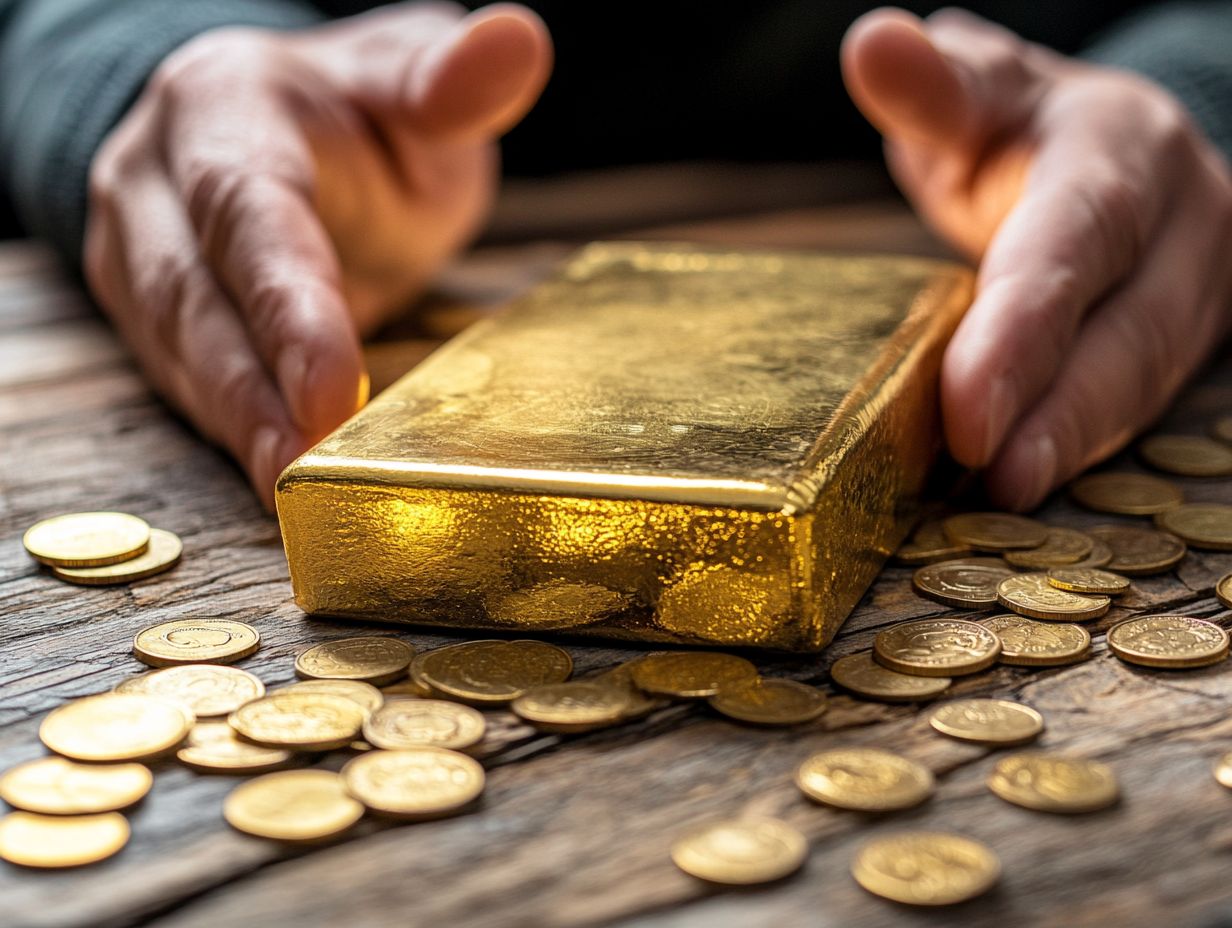
Gold stands as a formidable inflation hedge, safeguarding your wealth against rising prices that can diminish the purchasing power of fiat currencies (government-issued money that is not backed by a physical commodity), especially during tumultuous market periods.
Historically, gold has preserved its intrinsic value even when other assets stumble. For instance, during the 1970s, when the U.S. grappled with inflation rates soaring to around 14%, gold emerged as a safe haven, its value skyrocketing amidst the chaos.
After the 2008 financial crisis, as central banks unleashed expansive monetary policies, gold prices surged as investors flocked to this reliable store of wealth. In a world where paper currencies can fluctuate and trust in them wavers, the steady demand for this precious metal underscores its role as a steadfast asset, defending against the insidious effects of inflation.
Discover how you can start investing in gold today to secure your financial future!
Global Acceptance and Liquidity
Gold enjoys widespread global acceptance and liquidity, making it your go-to asset when navigating uncertain market conditions.
Its value remains stable or appreciates during economic turmoil. This drives demand when currencies start to wobble.
Central banks view gold as a strategic reserve asset, which helps maintain confidence in their monetary systems. In times of crisis, gold often serves as a safe haven for capital, allowing transactions to occur even when traditional banking systems face interruptions.
This unique standing in the global economy shapes market trends. Heightened central bank purchases can trigger significant spikes in gold prices.
The natural value of gold as a tangible asset enhances its attractiveness during periods of inflation or geopolitical tensions.
How to Invest in Gold for Crisis Preparedness
When investing in gold for crisis preparedness, consider a range of options. You can choose physical assets like gold bullion, which offers tangible security. You can also look into financial instruments such as exchange-traded funds (ETFs) that provide liquidity and ease of access.
Investing in shares of gold mining companies allows you to benefit from industry growth. Each avenue presents distinct advantages for diversifying your investment portfolio.
Explore Your Gold Investment Options
Consider several avenues for investing in gold: purchase physical gold bullion, invest in ETFs like SPDR Gold Shares (GLD), or acquire shares from mining companies such as Barrick Gold Corp. and Newmont Corp. Each choice has its advantages and challenges.
For example, physical gold acts as a safeguard against inflation and currency devaluation, making it a trusted choice for preserving wealth during economic downturns. However, be mindful of the associated storage and insurance costs.
ETFs like GLD provide greater liquidity and ease of trading, enabling you to gain exposure to gold prices without the complications of ownership. Just remember that management fees could reduce your returns.
Investing in mining stocks can also be rewarding, as it allows you to benefit from dividends and potential appreciation. However, this option comes with risks; these stocks are susceptible to market volatility and the operational risks tied to the companies themselves.
By diversifying among these options, you can create a balanced investment portfolio that leverages the unique benefits each gold investment offers.
Using Gold as a Currency in Emergency Situations

When a currency collapse is on the horizon, gold shines as your best alternative currency. This precious metal offers you a reliable means of exchange, allowing you to navigate through economic turmoil with confidence while safeguarding your purchasing power.
Practical Considerations and Tips
When using gold as currency, grasp its liquidity, understand the implications for your economic freedom, and learn how to effectively leverage it during financial crises.
In times of economic uncertainty, this precious metal is not just an investment; it becomes a practical asset for your immediate needs. Explore storage options, from safe deposit boxes to home safes, ensuring that your gold is accessible without compromising security.
Understanding local exchanges is crucial; knowing where to trade or sell gold gives you quick access to cash when necessary. Regularly assess market conditions such as supply shortages or governmental regulations to determine the optimal time and method for leveraging gold, maximizing its potential when you need it most.
Frequently Asked Questions
What is the significance of gold in crisis situations?
Gold has long been considered a safe-haven asset during times of crisis. Its value tends to increase during economic and political turmoil, making it a valuable asset for investors and individuals looking to protect their wealth.
For more information on investing in gold, consider consulting a financial advisor.
Why is gold considered a safe-haven asset?
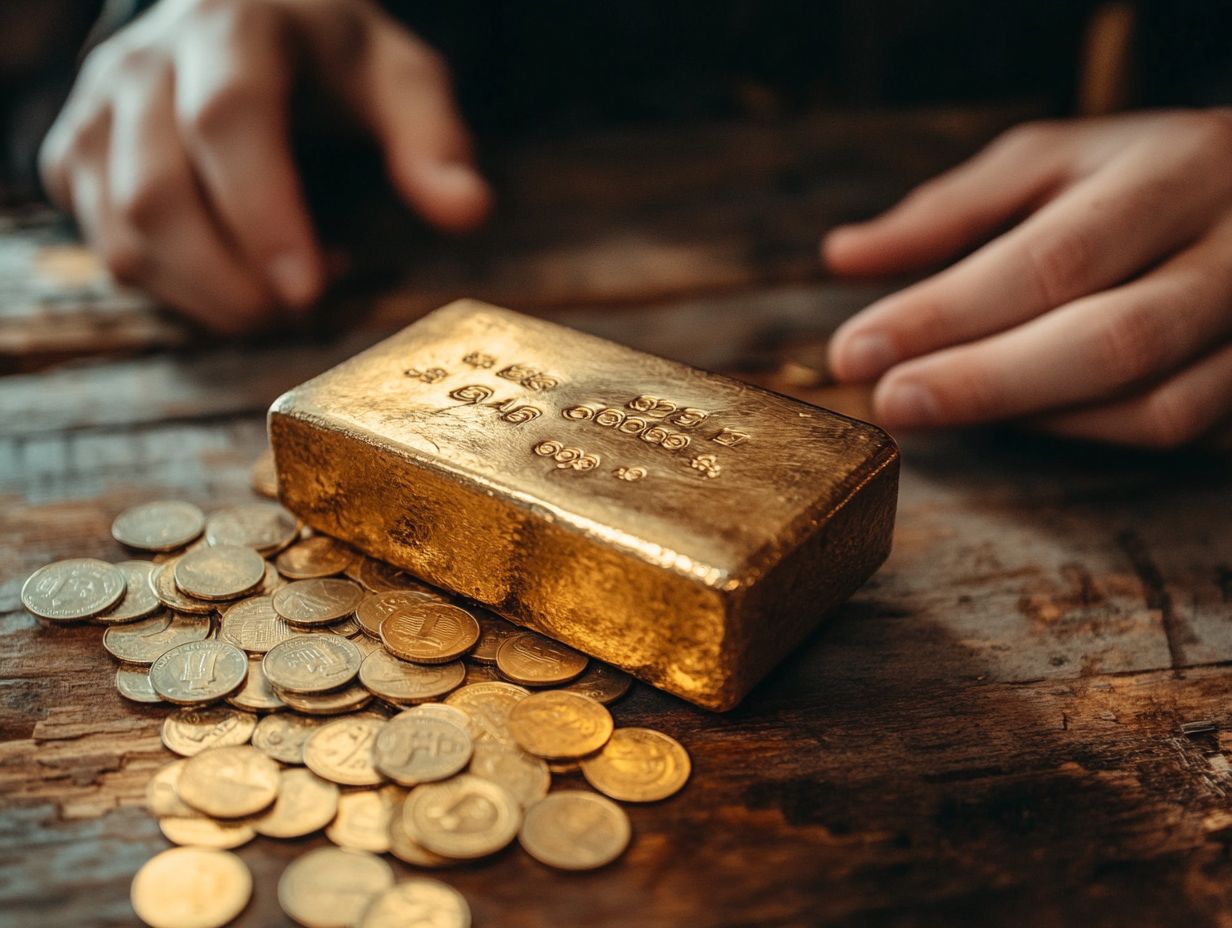
Gold is a safe-haven asset. It has served as a store of value for thousands of years.
It isn t tied to any government or currency. This makes it less vulnerable to market changes.
How does gold hold its value during crisis situations?
Gold retains its value during crises. It is a tangible asset that is hard to replicate or devalue.
Its scarcity and consistent demand make gold a reliable way to preserve wealth. This holds true even in uncertain times.
In what ways can gold be used in crisis situations?
In a crisis, gold can act as currency. It s widely accepted and recognized as valuable.
Gold also serves as a hedge against inflation. It helps diversify investments and protects against market volatility.
How has the importance of gold in crisis situations been demonstrated in history?
Historically, gold has been a means of exchange during wars and economic collapse. It has also been used in times of political turmoil.
Gold has served as a store of value during hyperinflation and currency devaluation.
Gold s lasting value and stability make it a sought-after asset during crises.
What role does gold play in the global economy during crisis situations?
In a global crisis, gold provides stability and cash availability. Its role becomes crucial for economies.
Gold serves as a benchmark for currency strength. It is a reliable store of value for central banks and investors during economic uncertainty.










